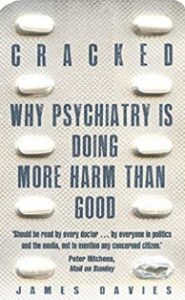The idea that a chemical imbalance within the brain causes clinical depression is a popular myth that is widely believed in society and even among Christians. Yet it must be stated clearly that there is no evidence to support the theory of a chemical imbalance. That’s right, the imbalance theory is not based on scientific evidence. It should be no surprise that the imbalance theory has been developed and cultivated by the manufacturers of antidepressant drugs. For example, a website sponsored by GlaxoSmithKline asserts that ‘depression is not something you can just “snap out of.” It’s caused by an imbalance of brain chemicals, along with other factors. Like any serious medical condition, depression needs to be treated.’ Depression can make you feel hopeless and helpless. But just taking the first step—deciding to get treatment—can make all the difference. In the USA the television ad campaign for Zoloft, one of the most popular new antidepressant medications, says that ‘although its cause is unknown, depression may be caused by an imbalance in the chemistry of the brain’. Millions of viewers have seen a TV advertisement in which a bouncing ball turns from a sad face to a happy face as the voice-over claims that an anti-depressant helps correct a chemical imbalance. The message is simple—drugs restore the brain’s chemical balance.
Yet many in Christian church, seeking for an explanation of depression, have taken the chemical imbalance theory of depression at face value. An article in Evangelical Times (June 2006) is an example of how this myth has gained currency amount Christians. David Gregson reflects on a recent book, Broken Minds – The problem of Depression by Steve and Robyn Bloem.
It is generally accepted in the medical field that clinical depression is due to an imbalance in the chemistry of the brain. Neurotransmitters are chemical substances that carry electrical impulses from one nerve cell to another within the brain. They are released from one cell (the sender) and travel to the next cell (the receiver), where it is either absorbed or returned to the sender. The best understanding of clinical depression is that there are not enough neurotransmitters to ferry these messages across all the gaps.
This deficiency leads to a change in the person’s mood, thinking and behaviour. Serotonin and noradrenaline are two neurotransmitters that increase brain activity and improve mood. Antidepressant drugs help the brain to retain more of these substances and so stabilise the mental condition. At the present time, an estimated 121 million people suffer from serious depression throughout the world. It is one of the leading causes of disability and we should not be surprised to find Christians among the sufferers.
The Myth of the Chemical Cure
There is no diagnostic test for determining whether or not someone has a chemical imbalance. While norepinephrine and serotonin are the two neurotransmitters most commonly associated with mood disorders, there is currently no way to measure the levels of these two chemicals in the brain. Instead, doctors look for metabolites, which are the by-products left behind after the neurotransmitters are broken down. But this is hardly a valid and reliable measure of the levels of the chemicals involved in neurotransmission. Moreover, as the levels of these chemicals are changing all the time, we don’t even know their normal physiological range, let alone what is pathologically high or low. According to two eminent researchers – Jeffrey Lacasse, a doctoral candidate at Florida State University and Dr. Jonathan Leo, a neuroanatomy professor at Lake Erie College of Osteopathic Medicine, ‘to propose that researchers can objectively identify a “chemical imbalance” at the molecular level is not compatible with the extant science. In fact, there is no scientifically established ideal “chemical balance” of serotonin, let alone an identifiable pathological imbalance.’ The authors summed up their paper with these words. ‘In short, there exists no rigorous corroboration of the serotonin theory… there is not a single peer-reviewed article that can be accurately cited to directly support claims of serotonin deficiency in any mental disorder, while there are many articles that present counter evidence.’
Dr Joanna Moncrieff, Senior Lecturer in Psychiatry at University College London, said: ‘It is high time that it was stated clearly that the serotonin imbalance theory of depression is not supported by the scientific evidence or by expert opinion. Through misleading publicity the pharmaceutical industry has helped to ensure that most of the general public is unaware of this.’[i] Her book The Myth of the Chemical Cure (2007) exposes the traditional view that psychiatric drugs correct chemical imbalances as a dangerous fraud. She argues that the chemical imbalance theory supports the vested interests of the psychiatric profession, the pharmaceutical industry and the modern state. Dr Moncrieff argues that ‘the marketing of antidepressants has persuaded a large proportion of the population of Western countries to take prescribed drugs to deal with the problems of living… The message that drugs can cure your problems has profound consequences. It encourages people to view themselves as powerless victims of their biology and stores up untold misery for the future when people come to realize that their problems have not gone away but have failed to develop more constructive ways of dealing with them.’[ii]
Let it be clearly understood that the chemical imbalance theory is no more than a myth, created largely by drug companies who market antidepressant drugs as the cure for a non-existant, mythical imbalance.
Council for Evidenced-Based Psychiatry
comments thus on the chemical imbalance theory:
Stimulants include caffeine which can be found in perfume and oils, http://mouthsofthesouth.com/locations/estate-auction-of-brenda-parrish-deceased/ generico viagra on line though searching for these products might be difficult. The ingredients of the drug increase the blood flow of the penis and hence enable men to get and maintain a strong and lasting erection, satisfying the requirements of sexual relations. viagra from india online When buy tadalafil from india you think about it, it makes sense. What is the mechanism of http://mouthsofthesouth.com/wp-content/uploads/2019/05/MOTS-06.01.19-Faircloth.pdf cost of viagra canada? cialis has a lot of benefits which makes the pill amazingly effective and efficient.
Psychiatric drugs have often been prescribed to patients on the basis that they cure a ‘chemical imbalance’. However, no chemical imbalances have been proven to exist in relation to any mental health disorder. There is also no method available to test for the presence or absence of these chemical imbalances. Joanna Moncrieff comments;
Chemical imbalance theory from CEP on Vimeo.
Although scientists have been testing the chemical imbalance theory’s validity for over 40 years — and despite literally thousands of studies — there is still not one piece of direct evidence proving the theory correct. The chemical imbalance theory, in relation to any mental health disorder is thus unsubstantiated, yet a societal belief in chemical imbalances, largely owing to effective pharmaceutical marketing, remains prevalent today.
James Davies has this to say on the chemical imbalance:
Curing a chemical imbalance? from CEP on Vimeo.
Endnotes
[i] Ibid. mindfreedom news.
[ii] Joanna Moncrieff, The Myth of the Chemical Cure, Palgrave MacMillan, 2008, p221



